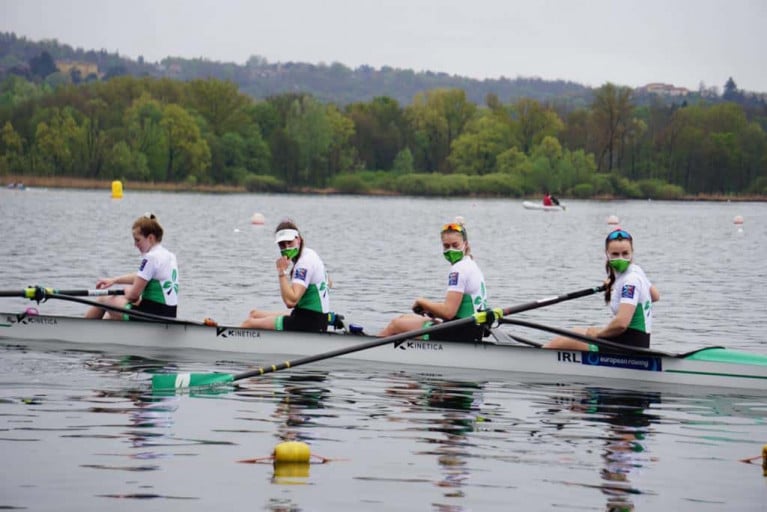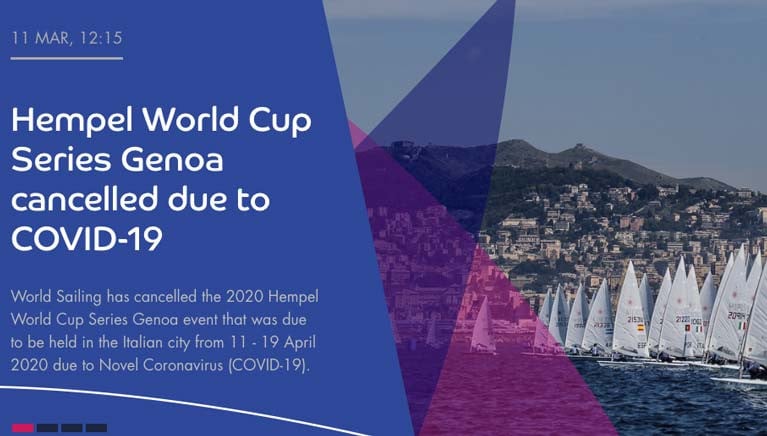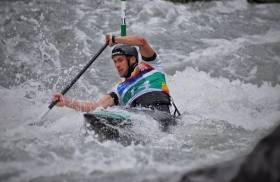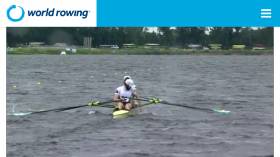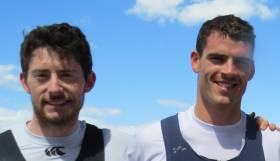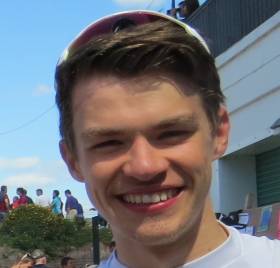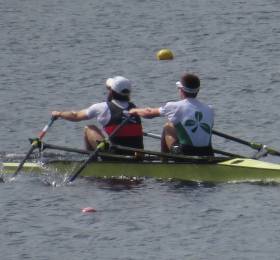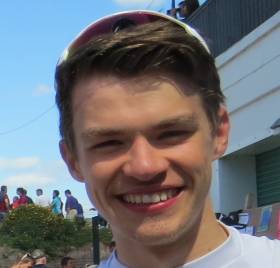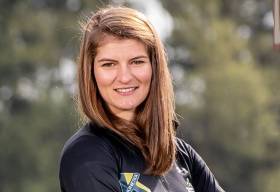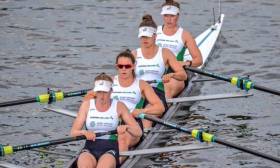Displaying items by tag: World Cup
Ireland Rowing Team Cancels Plan to Return Home Before World Cup
The Ireland rowing team which did so well at the European Championships in Italy will not return home as planned before their next outing in Lucerne in Switzerland. The team reached six finals and won gold and silver at the event and were due to return for a week to Ireland before going on to the Olympic qualification regatta and World Cup next month.
However, Ireland high performance director Antonio Maurogiovanni told Afloat today that he had spoken with the team and they had agreed that with the restrictions around Covid-19 quarantine becoming an issue it was more sensible to stay in their camp in Italy and then go on directly to Lucerne.
Two crews, the lightweight women’s double and the women’s four, will go to the Olympic qualification regatta (May 15th to 17th) and the rest of the team will compete at the World Cup (May 21st to 23rd).
Sanita Puspure, the world champion in the single sculls, missed the European Championships, but is set to join the team next week in Italy.
Ireland's bid for two further Tokyo Olympic 2020 places will be rescheduled after the cancellation of World Sailing's World Cup Series Genoa event that was due to be held in the Italian city from 11 – 19 April 2020 due to Novel Coronavirus (COVID-19).
As Afloat reported previously, following the outbreak of COVID-19 in Italy, World Sailing has been in regular contact with the Federazione Italiana Vela (FIV), the local organisers, and the Italian Government, receiving updates and closely monitoring the situation.
After a four year journey, Ireland is seeking the final places available in both the men's Laser dinghy and men's 49er skiff classes.
The World Sailing Board has also consulted the World Sailing Medical Commission prior to making this decision.
The decision was made to ensure the health and well-being of the sailors, support personnel, officials and volunteers, a top priority for World Sailing.
Hundreds of sailors, however, continue to arrive on the Spanish island of Mallorca for the Trofeo Trofeo Princesa, another Olympic regatta that takes place this month.
Hempel World Cup Series Genoa was to act as the final opportunity for Tokyo 2020 Olympic qualification for African, Asian and European sailors in a number of the Olympic Sailing Events. The International Olympic Committee (IOC) has granted World Sailing an extension of the qualification period to 30 June 2020.
World Sailing is now working in close collaboration with the IOC and Event Organisers to reschedule the remaining African, Asian and European Tokyo 2020 Olympic qualifiers and to ensure that all quota places can be allocated.
Further updates on qualification events will be issued by World Sailing with formal updates applied to the Tokyo 2020 Olympic Sailing Qualification System here.
Cochrane and Teague Qualify for Semis of World Cup Final
#Canoeing: Jake Cochrane and Eoin Teague made it through to the semi-finals at the canoe slalom World Cup Final in Prague. Teague, in the K1, and Cochrane in the C1, both qualified from their second runs. Liam Jegou did not in the semi-finals of the men’s C1. He came close in the first run and had three touches, incurring six seconds in penalties, in his second.
#Rowing: Paul O'Donovan and Fintan McCarthy took a second silver medal for Ireland after an extraordinary final of the lightweight double sculls at the World Cup in Rotterdam today.
Ireland took over the lead early and led all the way until they were caught right on the line by Germany - the photo finish showed just .03 of a second between the crews.
The race had a memorable moment in the second quarter. Paul O'Donovan showed great calmness to reach down and grab what looked like the stroke coach of the bowman which had gone over the side to shuck it back in the boat. The incident may have cost the crew time, but they retained their lead from there to the line.
Ronan Byrne and Philip Doyle had earlier sculled really well to take silver in the men's openweight double sculls.
World Cup Regatta, Rotterdam, Day Three (Irish interest)
Men
Double Sculls - A Final: 1 Switzerland 6:41.04, 2 Ireland (P Doyle, R Byrne) 6:41.74, 3 Britain 6:44.95.
Lightweight Double Sculls - A Final: 1 Germany 7:01.59, 2 Ireland (F McCarthy, P O'Donovan) 7:01.62, 3 Norway 7:02.26.
Women
Pair - A Final: 1 Australia 7:26.15, 2 New Zealand 7:27.57, 3 Britain 7:40.51; Ireland (A Crowley, M Dukarska) 7:50.08.
Lightweight Double Sculls - B Final (places 7 to 12): 6 Ireland (L Heaphy, D Walsh) 7:45.98.
Brilliant Silver for Ireland's Doyle and Bryne at World Cup
#Rowing: Ireland took a silver medal at the World Cup Regatta in Rotterdam. The double of Ronan Byrne and Philip Doyle mastered tough conditions well. They moved steadily up on early leaders Switzerland and Germany, and passed the Germans. They then pushed right up on Switzerland and, with a tremendous finish, closed to under a length off them - .7 of a second - as the crews crossed the line.
World Cup Regatta, Rotterdam, Day Three (Irish interest)
Men
Double Sculls - A Final: 1 Switzerland 6:41.04, 2 Ireland (P Doyle, R Byrne) 6:41.74, 3 Britain 6:44.95.
Women
Pair - A Final: 1 Australia 7:26.15, 2 New Zealand 7:27.57, 3 Britain 7:40.51; Ireland (A Crowley, M Dukarska) 7:50.08.
Lightweight Double Sculls - B Final (places 7 to 12): 6 Ireland (L Heaphy, D Walsh) 7:45.98.
#Rowing: Paul O'Donovan and Fintan McCarthy brought the tally of Ireland A Finalists at the World Cup Regatta in Rotterdam to four with a second-placed finish in their semi-final. Germany's Jason Osborne and Jonathan Rommelmann, racing in the favoured lane one were the dominant crew, but the new Ireland lightweight double finished fast, coming to just about a length on the line.
The Ireland women's lightweight double were out in lane six in the revised lane draw in their semi and finished sixth. Lydia Heaphy and Denise Walsh are set for a B Final.
World Cup Regatta, Rotterdam, Day Two (Irish interest; morning session)
Men
Double Sculls - Semi-Final Two (First Three to A Final; rest to B Final): 1 Ireland (P Doyle, R Byrne) 6:33.47, 2 Germany 6:36.17, 3 Australia One 6:38.62
Lightweight Double Sculls - Semi-Final Two (First Three to A Final; rest to B Final): 1 Germany One 6:42.04, 2 Ireland (F McCarthy, P O'Donovan) 6:43.70, 3 Australia 6:50.80.
Lightweight Single Sculls - Semi-Final Two (First Three to A Final; rest to B Final): 1 Slovenia 7:22.30, 2 3 Ireland One (G O'Donovan) 7:25.89, 3 Switzerland 7:27.70; 4 Ireland Two (J McCarthy) 7:34.79.
Women
Pair - Semi-Final One (First Three to A Final; rest to B Final): 1 Romania One 7:34.61, 2 Ireland (A Crowley, M Dukarska) 7:37.87, 3 Spain 7:39.49.
Lightweight Double Sculls - Semi-Final Two (First Three to A Final; rest to B Final): 6 Ireland (L Heaphy, D Walsh) 7:49.87.
Ireland Crews Weather Storm and Stay on Course
#Rowing: Paul O'Donovan and Fintan McCarthy hit the right mark in their first competitive race as the new Ireland lightweight double. At the World Cup Regatta in Rotterdam, they finished .39 seconds ahead of Australia in their time trial and qualified directly for the semi-finals.
The heats were run on a time trial basis as the regatta was buffeted by a storm and racing had to be delayed and the programme altered.
All six Ireland crews made it straight through in the changed system. The Ireland men's double of Philip Doyle and Ronan Byrne posted the best time in their heat, just ahead of Switzerland, who also qualified.
Aileen Crowley and Monika Dukarska also made it straight through. The Ireland pair finished second in their time trial to the outstanding New Zealand crew of Kerri Gowler and Grace Prendergast.
Jake McCarthy and Gary O'Donovan both qualified from their heats of the lightweight single sculls. McCarthy took second and O'Donovan third.
The one Irish crew which fell outside automatic qualification was the lightweight women's double of Lydia Heaphy and Denise Walsh. They finished fourth, but made it through as one of the fastest losers.
#Rowing: Paul O’Donovan will team up with Fintan McCarthy in the lightweight double at the World Cup Regatta in Rotterdam, the Netherlands, from July 12th to 14th. Gary O’Donovan and Jake McCarthy will compete in lightweight singles.
World and European champion Sanita Puspure will hope to continue her winning run in the single. Monika Dukarska and Aileen Crowley form a pair and Denise Walsh and Lydia Heaphy will compete again in the lightweight double, as will Ronan Byrne and Philip Doyle in the men’s openweight double.
Ireland Crews for World Rowing Cup Three, Rotterdam, July 12th to 14th
Men
Double: R Byrne, P Doyle
Lightweight Double: F McCarthy, P O’Donovan
Lightweight Singles: G O’Donovan; J McCarthy
Women
Pair: M Dukarska, A Crowley
Single: S Puspure
Lightweight Double: D Walsh, L Heaphy
#Rowing: The Ireland women’s four took fifth place, 11th overall, in their B Final at the World Cup in Poznan this morning.
Britain Two won an interesting race. Poland held the early lead, with Ireland, Germany and New Zealand not far behind. As Poland dropped back – and Croatia dropped out – the lead was taken over by New Zealand. However, Britain Two and Germany were the strongest crews in the second 1,000 metres, with Britain snatching the win from Germany by five hundredths of a second.
New Zealand were third and Ireland were over a length behind fourth-placed Poland.
Ireland finished sixth in the B Final of the women’s pair, 12th overall. In a close race, the United States Two won from Germany and Chile. Behind them, one second covered Italy Two, China Two and Ireland.
World Cup Regatta, Poznan – Day Three (Irish interest)
Women
Four – B Final (Places 7 to 12): 1 Britain Two 7:10.74, 2 Germany 7:10.79, 3 New Zealand 7:11.06; 5 Ireland (T Hanlon, M Dukarska, A Crowley, E Hegarty) 7:19.68.
Pair – B Final (Places 7 to 12): 1 United States Two 7:48.08, 2 Germany 7:50.03, 3 Chile 7:50.50; 6 Ireland (C Feerick, E Lambe) 7:56.69.
Ireland Four To Compete in B Final at World Cup Rowing
#Rowing: The Ireland women’s four are set for a B Final on Sunday after finishing sixth in their semi-final at the World Cup Regatta in Poznan. Australia beat the United States One crew after an exciting contest in this semi-final, with China producing good finish speed to take third – and a place in the A Final – from New Zealand.
Ireland’s crew of Tara Hanlon, Monika Dukarska, Aileen Crowley and Emily Hegarty were fifth at halfway, over a length off the top-four, and finished behind Britain Two, who took fifth.
World Cup Regatta, Poznan, Poland – Day Two (Irish interest)
Women
Four – Semi-Final One (First Three to A Final; rest to B Final): 1 Australia 6:54.54, 2 United States One 6:55.52, 3 China 6:55.87; 6 Ireland (T Hanlon, M Dukarska, A Crowley, E Hegarty) 7:08.16.
Pair – Semi-Final One (First Three to A Final; rest to B Final): 1 New Zealand 7:32.18, 2 Italy One 7:35.99, 3 China One 7:36.43; 6 Ireland (C Feerick, E Lambe) 7:51.17.



























